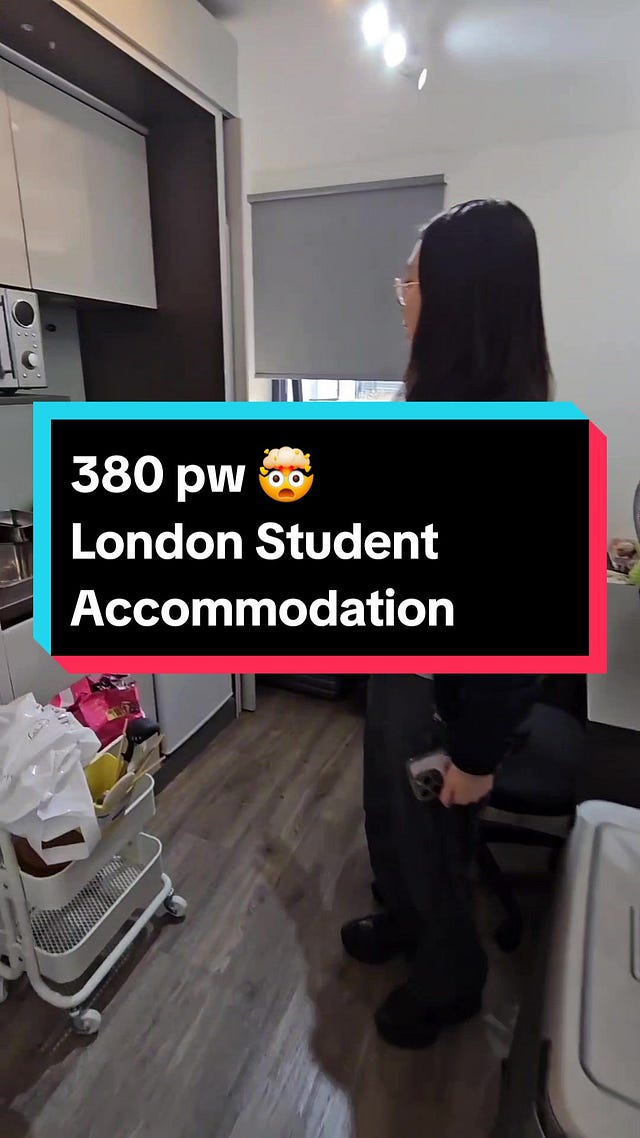Hello!
Thank you for joining me, I’m so glad you’re here.
I took a short break last week, as it was just a really hard week and my brain wasn’t ready to write by the time Sunday came along. For various reasons, the people in my team have been in and out for the past few weeks, and it came to a point where I was alone for a bit as well, trying to keep the plates spinning and pick up anything dropped. It’s been a lot.
However, I woke up this morning very ready to rock. Having watched one too many Stacy Solomon’s Sort Your Life Out episodes recently (the one show guaranteed to make me feel like I can achieve anything), I did a massive clear-out of my wardrobe, braved the big Tesco for a big shop, and even batch cooked for the week. I’m ready.

This week’s theme is office working, and I feel that my views might be controversial. I come at this from a place of privilege, being a child-free person, and am aware that my situation is different from those of other people.
As always, Bruce Daisley has written brilliantly about why hybrid working is better for diverse workforces, so please do read his post for a different take to the one I’m about to make:
Before I get into this, I’ll preface this with a few points:
Working somewhere in a hybrid workmode, only for that to be changed to fully on-site really sucks. People have built careers in places only for the rules to change, and I can’t imagine how hard that must be.
Bringing a Return to the Office mandate to avoid laying people off is cowardly behaviour - people need to have the ovaries to do what they intend to do without being shady about it.
Hybrid working, or at least where people can have a genuine say in how they work, will always be better for a wider range of employees.
When the pandemic started, I was renting a small, mouldy flat in Saffron Walden. I’d bought a gorgeous Japanese-style bed, a scabby £20 sofa from Facebook Marketplace, and a cheap rug. I was out every weekend socialising as well as running my Japanese conversation group in Cambridge, and out at work every weekday, so I needed a place to lay my head and cook a few meals.
I remember clearly when we were asked to go work from home, I thought, well how on earth will I do that. During that first week, I sat on the £20 sofa watching all the intranet posts from colleagues showing their lush home-office setups, and I felt awful in my crap flat.
Though I bought a desk and a nice chair, I started aggressively saving for my own home - I decided I would no longer be subjected to paying to live in a mouldy box. I’m writing this newsletter today in the office of that home I bought, an office with gorgeous lighting, with nice candles, and a climbing frame for my two cats.
I’m really lucky to have been in the position to have saved up for my deposit. One of the biggest challenges when we all started to work from home was looking after apprentices and grad colleagues, who were mostly living in houseshares. There was no quiet space for them to work, and with four other people competing for the wifi, it was hard to speak with them without interruption.
Mental health was also a challenge; I remember one apprentice I was supporting was in a bad way from not leaving their room. They would work 9-5 on the laptop on the desk next to their bed, then 5-9 would be sat in the same chair playing video games until their parents went to bed. Even in today’s hybrid world, with no restrictions on going outside, remote work can often lead to reduced socialisation, increasing poor mental health.
The roles I’ve had since 2020 have been a mixed bag - one required me to be in London once a week (down from the requested two days a week, when I explained that it’s £75 for a return ticket for my hour-long commute), and also somewhere that was very chill about office-work, so much so that when I went to the gorgeous (20 min walk away) office, hardly anyone was there and I would work alone, eat alone, and then go home. It was a lonely experience and looking back, I realise how sad I was.
When I was laid off and needing to find another job, the experience of understanding where a business was at with office work was a nightmare. In these times when loads of people have been laid off, and there are many more applicants than roles, businesses are forgoing the previous norm of recruiter screening calls, and using annoying, humanless tests and assessments to whittle applicant numbers down before an in-person interview. This leaves no space for the candidate to ask things like - what is the salary, and how many times do you want me to be in your London office? Twice during that period, I went over to London for interviews only to be looked at with displeasure when I asked about hybrid working. I don’t object to being in an office (more on that in a moment), but I find it hard to do an expensive commute unless my salary is adjusted for those costs.
Companies are way too coy with their hybrid working rules. If you require people to be in your office, say it with your chest. In job adverts, say exactly how your company works, and where your office is. You WILL turn people away, but you also won’t be attracting candidates who won’t work with how you need them to work.
I ended up working for a fully on-site employer - where I currently work. The rationale is that as 2/3 of our employees are blue-collar workers and can’t work from home, so we’re all in it together - everyone is equal. I dig that.
It’s a 20 minute drive for me, a £20 a week petrol bill in my little Toyota. Personally, I feel so much better being back in the office - whereas before I would have days when I didn’t leave my home, I am getting my steps in and feeling so much better for it. Before, I would come in to lonely, empty offices, but here we have office culture, with events on almost every week.
I connect with people, am able to share frustrations and wins, and have a wide range of connections with those around me. Senior leaders are also (of course) on site, and I benefit from them taking the time to show me their world as well as getting to know them as work-friends.
It took adjusting, and in fact I am still adjusting. I bought some Loop earplugs this week because working in a noisy office makes it harder to do focus-work. I am not as productive as I was at home, but I am able to lead my team better as I am not reliant on them telling me something is wrong through video catchups. Especially with male colleagues who can be more likely to withhold their feelings, being able to physically see if people are OK or not is important. There is often a lot of “managers who can’t lead remotely are bad managers” talk, and I am not ashamed to say that it is easier to see when there is a problem when my team is next to me. Plus the fact that proximity bias is really hard to overcome - if you have a blend of local and offshore colleagues in your team, it’s hard to ensure that your attention, support and praise is distributed equally.
Bruce’s excellent newsletter above mentions that return to the office benefits the young, and the male (who are less likely to have caring duties). While inclusivity is of course really important, I think I would take that and flip it, to say that very hybrid workplaces disadvantage young colleagues.
As I wrote last year, it’s really important for younger employees to be able to observe others when they’re building their career:
In the four months I’ve been in this role so far, my team have heard me apologise for screw-ups, make phonecalls to candidates to both reject and offer them, and because we are all sit on the generic HR phoneline, we listen to each other support our colleagues from the business with all kinds of enquiries.
I am not saying that the way I do all of those things is the best way to do them, but they may learn something from how I deal with different situations. As a sidenote, one of my previous employers was a real fan of recruitment team scripts. While it’s an answer to teaching the team what to say in a hybrid workstyle, it often sounds stilted, and it took ages for the team to be able to say the script in a natural and confident way.
I’ll pause here to say that this is not me saying that I think that everyone should come back to the office. I guess my strongest feeling with all of this is that people go really over the top when it comes to office work, treating employers who do prefer office work as if they are villains. Some are, sure. But some aren’t.
When it comes down to it, we need a range of places to work at. I found it incredibly frustrating that so many employers were in London when I was looking for work. The lack of viable work in regional towns is a huge issue, and will only drive the need for hybrid work if it continues. If some employers are on-site, it doesn’t mean they are terrible people. They just - for whatever reason - have decided that on-site works best for them.
And yes, on-site for the sake of being on-site sucks. Especially when there is no culture to come in to, and no efforts to facilitate the building of relationships, and no growth as a business through the strength of their employees coming together.
There is a demographic for whom hybrid, or fully remote is a must. But there is also a demographic - including those who live in househares, those who want to learn and grow, those who need to be forced to connect with others to maintain a healthy mind - for whom working in the office is important. And this blanket “office is bad” narrative is overlooking people in this second category.
I fully support the continued discussion around what the future of work will look like, but we really need to move beyond demonising workplaces that don’t offer hybrid. In an employer-driven market this does really suck, as some people may be forced into a workstyle that doesn’t meet their needs. But even when the tables turn, I hope that there remains a good mix of remote, hybrid and on-site options for people to choose from.
And lastly, as we build the future of work, I hope that we give as much care to the next generation as we do to more experienced employees who have a range of needs. Someone who needs to be around others to learn, and remain mentally healthy is just as important as someone who needs flexibility around caring duties.
Links
TikTok
I loved this video of some students doing a tour of their student accommodation. These kinds of videos are so important for those looking to apply to uni next year:
You know I’m a sucker for content that shows what it’s like working in different jobs, so here is a lovely little clip of those working in the emergency services:

 Tiktok failed to load.
Tiktok failed to load.Enable 3rd party cookies or use another browser
This is the kind of office loneliness I was talking about above. Though it’s not great they’re on TikTok all day, if they had social pressure from people working around them, it might help kick them into better habits.
Next is the very sad story of Anna Sebastian Perayil, a 26 year old working at EY who allegedly died through being overworked. Here is a Reddit post with screenshots from Anna’s LinkedIn showing how new she was in the business, as well as screenshots of the heartbreaking letter from Anna’s mum. It’s all so heartbreaking, and I hope that EY takes a moment to assess how they work.
You know how I said above about stupid recruitment tests? I was talking about stuff like this.
If you’re looking out for a new employee benefit, this organisation seems to have made a very unique choice of reward for a long-serving employee!
I’ll leave you with one last TikTok. Enjoy.
Have a great week ahead!
Until next week,
Charlotte









Thank you for the shout out ❤️
My point (and I substantiated it here https://www.makeworkbetter.info/p/no-one-is-listening-to-your-bosss?utm_campaign=post&utm_medium=web) was that most people don’t pay £20 a week to get to the office. Rather they pay more than that a day. And so as a result office time needs to be able to prove its worth. I’m a strong fan of office time if it fosters togetherness but I’m not convinced we need it every day. 3 times a week seems plenty.